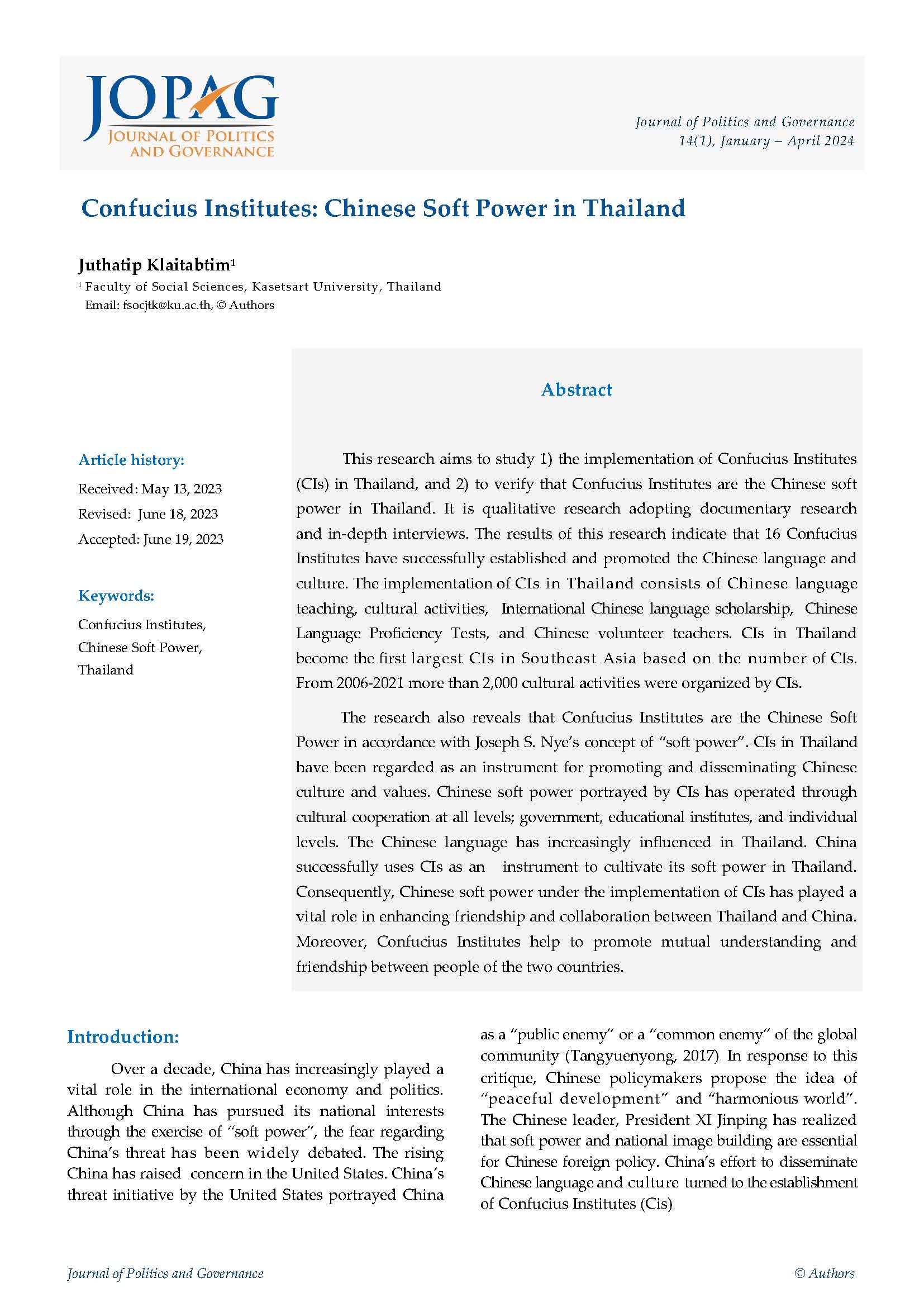Confucius Institutes: Chinese Soft Power in Thailand
Main Article Content
Abstract
This research aims to study 1) the implementation of Confucius Institutes (CIs) in Thailand, and 2) to verify that Confucius Institutes are the Chinese soft power in Thailand. It is qualitative research adopting documentary research and in-depth interviews. The results of this research indicate that 16 Confucius Institutes have successfully established and promoted the Chinese language and culture. The implementation of CIs in Thailand consists of Chinese language teaching, cultural activities, International Chinese language scholarship, Chinese Language Proficiency Tests, and Chinese volunteer teachers. CIs in Thailand become the first largest CIs in Southeast Asia based on the number of CIs. From 2006-2021 more than 2,000 cultural activities were organized by CIs.
The research also reveals that Confucius Institutes are the Chinese Soft Power in accordance with Joseph S. Nye’s concept of “soft power”. CIs in Thailand have been regarded as an instrument for promoting and disseminating Chinese culture and values. Chinese soft power portrayed by CIs has operated through cultural cooperation at all levels; government, educational institutes, and individual levels. The Chinese language has increasingly influenced in Thailand. China successfully uses CIs as an instrument to cultivate its soft power in Thailand. Consequently, Chinese soft power under the implementation of CIs has played a vital role in enhancing friendship and collaboration between Thailand and China. Moreover, Confucius Institutes help to promote mutual understanding and friendship between people of the two countries.
Article Details

This work is licensed under a Creative Commons Attribution-NonCommercial-NoDerivatives 4.0 International License.
References
Chinese International Education Foundation. (2021). Global Network. https://www.cief.org.cn/qq
Confucius Institutes. (2022). Confucius Institutes: Thematic Area. Academic Groups.
Confucius Institute Headquarter (Hanban). (2021). About Confucius Institute/Classroom. https://www.english.hanban. org/node_10971.htm
Erudera. (2023). China International Student Statistics. Erudera.com. https://erudera.com/statistics/china/china-international-student-statistics/
Fungtammasan, A. (2011). Qian Qichen Talks about World Situations and China’s Foreign Policy [Sathanakarnlok Kabkarntootchin]. Matichon Press.
Hanban. (2015). The first “Confucius Institute of Maritime Silk Road” established in Thailand. http://english.hanban.org/article/2015-07/06/content_608534.htm
Hanban. (2021). About Confucius Institute. http://english.Hanban.org/node_10971.htm
Manikikar, Kalpit, A. (2022). China’s Sharp Power: Blunting the World’s Edge or a Moment of Global Awakening? ORF Issue Brief. Observer Research Foundation.
Maritime Silk Road Confucius Institute Dhurakit Pundit University. (2021). Maritime Silk Road Confucius Institute. https://www.dpu.ac.th/msrci/documents.php
Nation. (2017). Thai Students seek for opportunities in Chinese Universities under the LMC scheme. https://www.nationmultimedia.com/detail/asean-plus/30334785
Nye, Joseph, S. (2007). Notes for a soft power research agenda. In F. Berenskoetter & M. Williams (eds). Power in World Politics. (pp.162-172). Routledge.
Nye, Joseph, S. (2005). Soft Power: The Means to success in World Politics. Public Affairs.
Nye, Joseph, S. (2011). The Future of Power. Public Affairs.
Repnikova, M. (2022). Chinese Soft Power. Cambridge University Press.
Statista. (2022). Number of Confucius Institutes in Asia as of December 2018, by country. https://www. statista.com/statistics/879176/china-confucius-institutes-in-asian-countries/
Tangyuenyong, P. (2017). Decoding the Diplomatic Discourse of Contemporary China: Meaning Construction and Role in World Politics. International Journal of East Asian Studies, 21(2), 19-34.
The Brussels Times. (2019). Brussels university to close Chinese-funded institute after espionage accusations. https://www.brusselstimes.com/belgium/83195/brussels-university-to-close-chinese-funded-institute-after-espionage-accusations-vub-confucius-institute
The Washington Post. (2019). Why U.S. universities are shutting down China-funded Confucius Institutes. https://www.washingtonpost.com/news/monkey-cage/wp/2019/01/11/u-s-universities-have-shut-down-confucius-institutes-heres-what-you-need-to-know/
Trisanawadee, S. (2020). Chinese Cultural Diplomacy towards ASEAN Countries: Case Study of Confucius Institutes in Thailand. Manutsayasat Wichakan, 27(2),416-450.
Tungnirun, A. (2018). China 5.0: Xi Jinping New Economic and New Plan AI. Bookscape.
Walker, C., & Ludwig, J. (2017). The Meaning of Sharp Power: How Authoritarian States Project Influence. Foreign Affairs. http://www.foreignaffairs. com/articles/china/2017-11-16/meaning-sharp-power
Wang, Y. (2019). Confucius Institutes in Thailand: Revealing the Multi-dimensionality of China’s Public Diplomacy. Journal of the Graduate School of Asia-Pacific Studies, 37(3), 99-113.
Wu, Y. (2019). Recognizing and resisting China’s Evolving Sharp Power. American Journal of Chinese Studies, 26(2), 129-154.
Wu, C. (2018). Comparative study and assessment of Confucius Institutes in Southeast Asian. The global CI Database. Institute of International Education of Minzu University of China.
Zhou, Y. (2021). Confucius Institutes in the Sino-Thai Relations: A display of China’s soft power. Asian Journal of Social Science, 49(4), 234-243.


